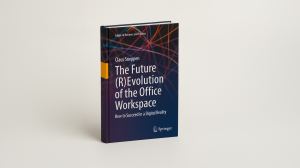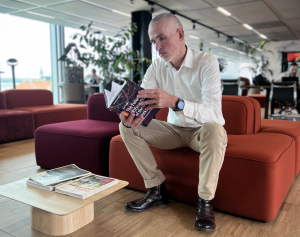New Book on the future of the workplace
In his newly published book, The (R)Evolution of the Office Workspace, Claus Sneppen examines the future of the workplace.
COPENHAGEN, DENMARK, May 1, 2025 /EINPresswire.com/ -- For many leaders, the post-pandemic ideal remains a “return to a new normal” - a revival of the office as we knew it, just adding flexibility. But this vision will prove unrealistic. The office is no longer a static entity, and today’s office workplace is caught between two opposing forces: long-term investments in systems, structures, and spaces designed for stability, and the relentless pace of digital transformation reshaping how knowledge work is actually done.In his newly published book, The (R)Evolution of the Office Workspace (Springer Nature, Future of Business and Finance Series), Claus Sneppen, Associated Partner at the Copenhagen Institute for Futures Studies, examines this deep and accelerating disruption. He argues that while office infrastructures—whether physical layouts, IT systems, or governance structures—are inherently long-term and near-static, the digital worklife they’re supposed to support is fast-moving, dynamic, and constantly evolving.
This creates a growing mismatch between how offices are built and how work actually happens.
The pandemic didn’t cause this tension - it exposed and accelerated it. Hybrid and remote work models are no longer temporary fixes but enduring components of the modern office workplace. As a result, organisations must now manage a complex balancing act: digital vs. physical, autonomy vs. collaboration, employee expectations vs. leadership control.
Despite early predictions of a return to pre-pandemic norms, remote work remains deeply embedded. Middel-managers are under pressure to bridge the gap between top-down expectations and the lived realities of their teams. Economic uncertainty adds further pressure, challenging organisations to decide whether to double down on traditional office models or embrace flexibility as a strategic asset.
“The future of the office is not about what leaders wish for - it’s about objective evaluation and adaptation,” says Sneppen. “Success in the hybrid era demands more than incremental change. It requires a rethinking of how we design office workspaces, lead teams, and structure organisations.”
Organisations that will thrive are those that embrace change - not reactively, but strategically. This means developing hybrid models grounded in agility, data, and foresight. It means letting go of outdated assumptions and acknowledging that today’s workforce values flexibility, autonomy, and meaning over presence and predictability.
Ultimately, a sustainable hybrid and flexible office model must be seen as a continuous process - not a one-time solution. The real question isn’t whether the office will change. It’s how quickly leaders can evolve with it.
For media inquiries, interviews, or review copies, please contact:
Claus Sneppen
Wiskott-Aldrich Syndrome Treatment Market Report 2025: Size, Trends, and Growth Insights for Global Expansion
NextStep Arthropedix Embarks on ASC Expansion
Ultra-high Temperature (UHT) Processing Market to Surpass USD 6.1 Billion in 2025, as Rising Demand for Convenient Food
Kalendarium
Więcej ważnych informacji
 Jedynka Newserii
Jedynka Newserii

 Jedynka Newserii
Jedynka Newserii

Motoryzacja

UE dąży do większej samodzielności w dostępie do surowców krytycznych. Częściowo pozyska je z recyklingu baterii
Zgodnie z aktem o surowcach krytycznych władze unijne dążą do zwiększenia niezależności w zakresie ich dostaw od Chin i innych krajów trzecich. Do 2030 roku ze źródeł zewnętrznych ma pochodzić nie więcej niż 65 proc. rocznego zużycia każdego z surowców. Z kolei 25 proc. ma pochodzić z recyklingu. – Te cele nie są nadambitne, bo recykling to relatywnie młoda część gospodarki, więc legislacja, która narzuca te poziomy odzysku i recyklingu to jedno, a realia to drugie – mówi Paweł Jarski, prezes zarządu Elemental Holding. Podkreśla jednak, że Europa ma duży potencjał w zwiększeniu odzysku i przetwarzania cennych surowców
Konsument
Konsumenci doceniają działania firm na rzecz środowiska i społeczeństwa. Dla przedsiębiorstw to szansa na rozwój

Zrównoważony rozwój staje się coraz ważniejszym elementem strategii biznesowych firm. Podmioty wdrażające długofalową strategię ESG mogą liczyć na korzyści finansowe, większe zainteresowanie inwestorów oraz poprawę klimatu i społecznej akceptacji. Spółki i przedsiębiorcy, którzy realizują inwestycje zgodnie z najwyższymi standardami środowiskowymi i społecznymi otrzymali Diamenty Zrównoważonej Gospodarki podczas konferencji Sustainable Economy Summit.
Edukacja
Poziom kompetencji cyfrowych Polaków na bardzo niskim poziomie. Spowalnia to cyfryzację gospodarki i firm

Na tle mieszkańców innych państw UE poziom kompetencji cyfrowych Polaków utrzymuje się na bardzo niskim poziomie – wynika z ostatnich danych Eurostat. Niecała połowa deklaruje posiadanie przynajmniej podstawowych umiejętności cyfrowych, a 20 proc. – więcej niż podstawowe. Staje to na drodze do cyfryzacji gospodarki i zwiększenia produktywności przedsiębiorstw.
Partner serwisu
Szkolenia

Akademia Newserii
Akademia Newserii to projekt, w ramach którego najlepsi polscy dziennikarze biznesowi, giełdowi oraz lifestylowi, a także szkoleniowcy z wieloletnim doświadczeniem dzielą się swoją wiedzą nt. pracy z mediami.










.gif)

 |
| |
| |
|